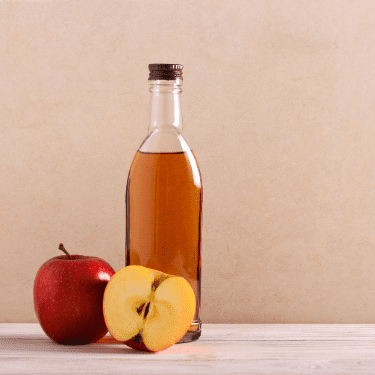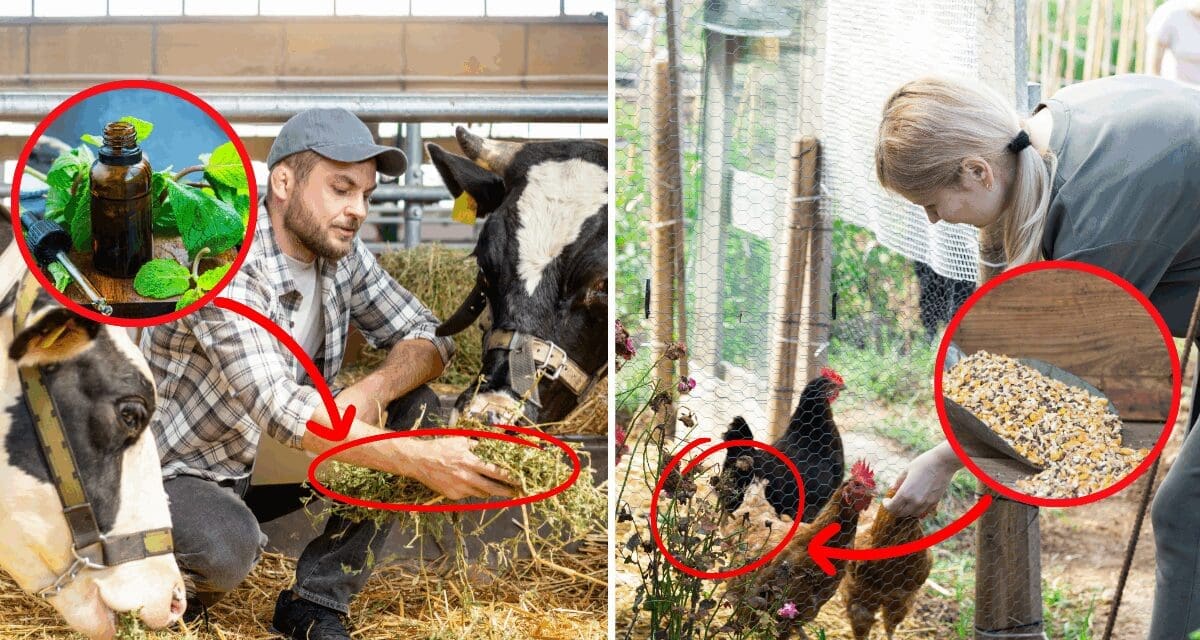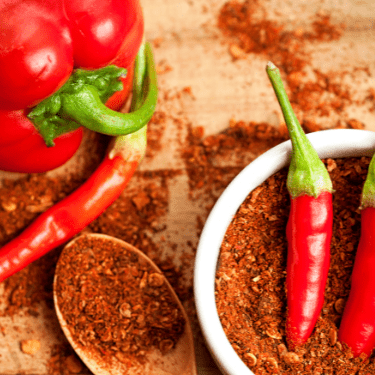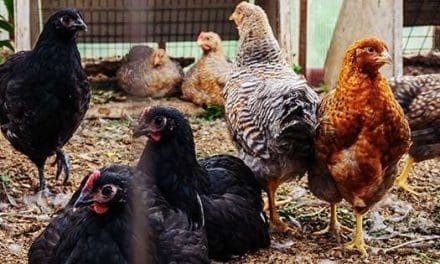When livestock fall sick, things can go downhill fast. What starts as a minor cold in a goat or a patch of scours in a calf can quickly spread, costing you valuable time, money, and even animals if you’re not prepared.
Out here, waiting on a vet isn’t always an option, so farmers and homesteaders have always leaned on natural remedies to keep their animals healthy. These time-tested treatments, made from herbs, plants, and simple ingredients you probably already have on hand, can make all the difference when trouble strikes.
In this article, I’ll walk you through 10 natural remedies for common livestock ailments- practical solutions you’ll be glad to know before you ever need them. And don’t worry, many of these ingredients are already sitting in your pantry.
Apple Cider Vinegar
If your livestock experiences frequent stomach problems, then this is the tonic you must include in their diet. Apple cider vinegar is one of the most effective remedies to balance pH level and gut bacteria in poultry, cattle, and even goats. You don’t have to do much, just mix 1-2 tablespoons of it into each gallon of water and boost your livestock’s immunity.
If apple cider vinegar can boost your livestock’s health, imagine what it can do for you when a bad cold hits. The Amish Fire Water is a powerful, time-tested remedy that can stop a cold or flu in its tracks – but ignore the first warning signs, and you’ll wish you had it on hand. You’ll find the full recipe and step-by-step instructions right here, so you’re never left helpless when sickness strikes.
Oregano
Oregano has always been nature’s antibiotic. It is particularly effective in treating respiratory issues in pigs and poultry. Even a few drops of its essential oil can fight off bacteria, fungi and parasites.
For effective results, steep 1 tablespoon of oregano in a cup of hot water, then cool and mix it in your livestock’s drinking water. Additionally, if you want a more potent immunity booster, sprinkle crushed oregano leaves on your animal’s feed.
Garlic
Another effective remedy to treat respiratory issues in livestock is garlic. Its antiparasitic and antibiotic properties can help ward off worms and improve immunity. You can simply mash some garlic and mix it with your livestock’s feed, or combine it with honey for picky eaters.
>>> Why You Should Put Garlic in Your Ear Before Going to Sleep
For poultry, consider steeping garlic in water overnight, then straining and offering it as drinking water. Ensure to administer this remedy as soon as you notice any signs of illness and see the wonders.
Diatomaceous Earth (DE)
Food-grade diatomaceous earth can aid a lot in deworming livestock. When used in the right amount, it can improve digestion and make your farm friend’s coat healthy. For internal parasites, consider mixing 1 tablespoon of DE in every 50 pounds of feed.
Additionally, if parasites are external, directly sprinkle DE onto your livestock’s coat. You can also add it to their bedding to remove any parasites. While you’re handling DE, wear a face mask, as inhaling it can trigger allergies or respiratory problems.
Epsom Salts
Epsom salt helps in treating constipation, bloating, and infections. It is a gentle laxative and has soothing effects if used externally on any kind of injuries, especially relating to hooves. If your goats or sheep have stomach problems or are constipated, mix a teaspoon of it in warm water and let them drink it.
However, for treating wounds, consider preparing a solution of half a cup of salt in a gallon of warm water. For hoof abscesses, you can soak them directly in this water for about 10-15 minutes. But if an area is injured, use a cotton swab to dab the solution over the wound.
Aloe Vera
Chickens are natural peckers, and sometimes they may peck each other while competing for resources. Because of this reason, your feathered animals may be the ones that are injured the most.
Related: Can Chickens Eat Celery?
To provide them quick relief, cut off an aloe vera leaf from the nearest planting pot and apply it to the injured area. Apply twice daily and see the wounds disappear. Ensure not to use store-bought aloe vera gel for livestock, as it may contain harmful additives.
Activated Charcoal
A homesteader who is raising livestock on his farm must have activated charcoal all the time on hand. Why? Because it is a lifesaver for poisoning, diarrhea or even severe digestive problems. It binds with the toxins in the digestive tract and prevents their absorption.
But how do you administer it? Take one cup of warm water and add 1 tablespoon of activated charcoal to it. After mixing it, carefully administer it using a drenching syringe. In case of severe poisoning, repeat this procedure every 2 to 3 hours.
Activated charcoal has powerful benefits for humans too, helping with food poisoning, digestive upset, or even detoxifying after accidental ingestion of harmful substances. And for more stubborn problems, remedies like Black Milk and Black Drawing Salve can draw out infections, treat abscesses, and handle wounds that won’t heal on their own. You can find the full step-by-step recipes for these, and 250+ more, right here.
Calendula
Calendula, or marigold, has also been long known as a great healer. Its anti-inflammatory properties are known to soothe skin irritations, heal wounds, and improve digestion. For wounds, it is often administered as a salve. To prepare, infuse dried calendula petals in olive oil for 2 to 3 weeks. Strain this oil and mix with beeswax and apply it to cuts, sores, or scrapes.
If you don’t want to wait weeks to make your own, there’s a ready-to-use all-purpose salve made by one of the most trusted herbalists around. It’s incredibly effective for humans and it can be used on larger livestock too – just make sure they don’t lick it off. This way, you have a trusted remedy on hand for both your homestead and your family, and you don’t have to spend hours making it in the kitchen either. Here is where I personally got it from.
For internal use, boil a few petals of calendula in a cup of water. Strain and cool off this solution, and administer it in drinking water to your livestock.
Cayenne Pepper
To treat seasonal colds, consider administering cayenne pepper to your livestock. This fiery spice stimulates circulation and relieves respiratory problems in animals. Because of its health and energy-boosting capabilities, it is a potent remedy to administer during winter.
To boost energy, mix half a teaspoon of cayenne powder into a gallon of poultry feed. Or to cure a cold, add a teaspoon in hot water, cool it down, and add it to drinking water.
Tea Tree Oil
Tea tree oil is another strong antibacterial and antifungal agent. It is usually administered for treating skin infections, hoof problems, or open wounds. It should never be applied directly due to its potent nature. Instead, it must first be diluted in a tablespoon of coconut oil and then applied to the infected area. Furthermore, do not attempt to administer it to the livestock orally.
Final Thoughts
Natural remedies provide a sustainable, affordable way to keep livestock healthy on the homestead. From pantry staples like garlic and honey to healing plants like calendula, these age-old solutions still hold power today. While they don’t replace veterinarians, they give you self-reliance when professional help isn’t immediately available.
With these simple remedies, you’ll be prepared to care for your animals naturally and effectively.
This Is How I Kept My Livestock Alive During The Disaster
Whatever You Do, Never Feed These To Your Livestock (Video)
These Mistakes Could Kill Your Livestock
Best And Worst Livestock For Homesteaders
Livestock Animals You Should Start Raising For The Upcoming Economic Crisis

















